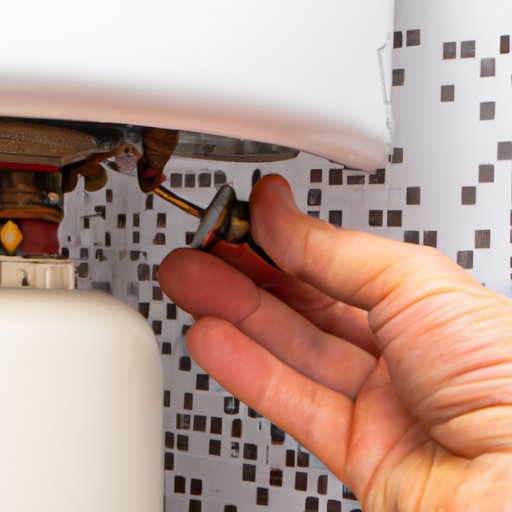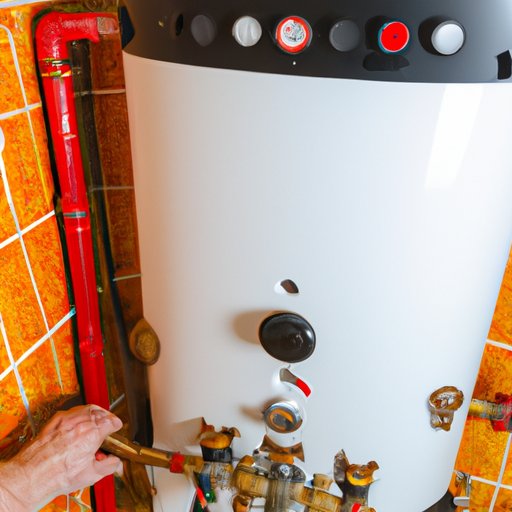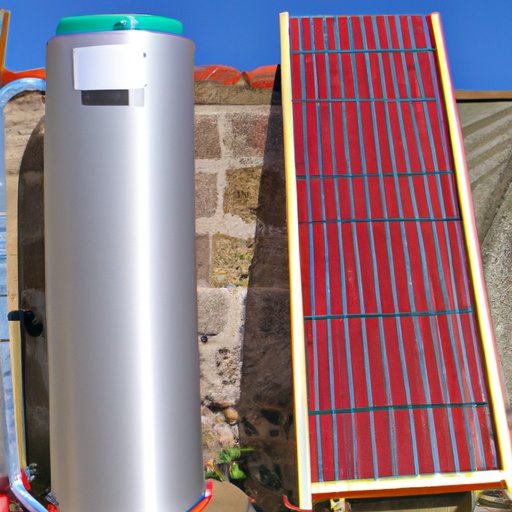Introduction
A hot water heater is a device used to heat water for a variety of purposes, such as bathing, cleaning, and cooking. It usually consists of a tank that holds heated water, a thermostat to control the temperature of the water, and a heating element to heat the water. Depending on the type, a hot water heater can be powered by electricity, natural gas, propane, or even solar energy. In this article, we’ll explore the components of a hot water heater and how they work together to heat water, the different types of hot water heaters available, common problems and how to fix them, and tips for maintaining and extending the life of your hot water heater.
Explaining the Components of a Hot Water Heater and How They Work Together
There are several components to a hot water heater, each of which plays a key role in the overall process of heating water. The most important components include a water storage tank, a thermostat, a heating element, and a pressure relief valve. Here’s a brief overview of each component and how it works:
The water storage tank is where the heated water is stored. It’s usually made from steel or copper and insulated with foam or fiberglass. The size of the tank will depend on the amount of hot water you need at any given time. The thermostat is responsible for controlling the temperature of the water. It’s located inside the tank and is connected to a temperature gauge. The heating element heats up the water in the tank. It’s usually powered by electricity, natural gas, or propane. Finally, the pressure relief valve is designed to release excess pressure from the tank if it gets too high.
These components all work together to heat the water in the tank. When the thermostat senses that the temperature of the water is below the desired level, it signals the heating element to turn on. The heating element then heats up the water until it reaches the desired temperature. Once the water reaches the desired temperature, the thermostat will signal the heating element to turn off. This process is repeated until the desired temperature is maintained.
An Overview of Different Types of Hot Water Heaters and Their Advantages & Disadvantages
There are several types of hot water heaters available on the market today. The most common types are traditional tank hot water heaters, tankless hot water heaters, and solar hot water heaters. Each type has its own advantages and disadvantages, so it’s important to understand the differences between them before making a decision.
Traditional tank hot water heaters are the most common type of hot water heater. They have a large tank that stores heated water, and they use electricity, natural gas, or propane to heat the water. The main advantage of traditional tank hot water heaters is that they’re relatively inexpensive and easy to install. The main disadvantage is that they require a lot of energy to heat the water, which can lead to higher energy bills.
Tankless hot water heaters are becoming increasingly popular due to their energy efficiency. They don’t have a large tank, but instead heat water on demand. This means that they only use energy when hot water is needed, which can save you money on your energy bills. The main disadvantage of tankless hot water heaters is that they require a larger upfront investment than traditional tank hot water heaters.
Solar hot water heaters use the sun’s energy to heat water. They’re becoming increasingly popular due to their environmental friendliness and cost savings. The main disadvantage is that they require a lot of space and can be expensive to install.
The Pros and Cons of Tankless Hot Water Heaters
Tankless hot water heaters offer several advantages over traditional tank hot water heaters. For one, they’re more energy efficient because they only heat water when it’s needed. This means that you won’t have to worry about wasting energy heating water that isn’t being used. Additionally, tankless hot water heaters typically last longer than traditional tank hot water heaters, as they don’t suffer from the same corrosion and sediment buildup that can occur in traditional tank hot water heaters.
However, there are some drawbacks to using a tankless hot water heater. For one, they require a larger upfront investment than traditional tank hot water heaters, which can make them less appealing for those on a tight budget. Additionally, tankless hot water heaters may not be able to keep up with the demands of multiple showers or dishwashers running simultaneously, as they can only produce a certain amount of hot water at once.

Common Problems with Hot Water Heaters and How to Fix Them
Hot water heaters can experience a variety of issues over time. Some of the most common problems include pilot light issues, clogged drain lines, and water leaks. Fortunately, many of these issues can be fixed with relative ease. If your hot water heater isn’t producing hot water, check the pilot light first. If it’s out, you may need to relight it. Clogged drain lines can be cleared with a plumbing snake, and water leaks can often be repaired with a simple pipe repair kit.

Tips for Maintaining and Extending the Life of Your Hot Water Heater
Regular maintenance is essential for keeping your hot water heater in good condition and extending its life. First and foremost, you should flush your hot water heater at least once a year. This will help remove sediment buildup and ensure that your hot water heater is working efficiently. Additionally, you should inspect the pipes and connections for signs of wear or corrosion and replace any parts that appear to be damaged. Finally, you should check the pressure relief valve regularly to make sure it’s functioning properly.

Comparing the Cost of Traditional and Solar Hot Water Heaters
When deciding between traditional and solar hot water heaters, it’s important to consider the cost. Traditional hot water heaters typically cost less upfront, but they can be expensive to operate due to their energy consumption. Solar hot water heaters, on the other hand, can be expensive to install but can save you money on your energy bills in the long run. Ultimately, it’s important to weigh the pros and cons of each option carefully before making a decision.
Conclusion
Hot water heaters are an essential part of modern life, providing us with hot water for bathing, cleaning, and cooking. In this article, we’ve explored the components of a hot water heater and how they work together to heat water, the different types of hot water heaters available, common problems and how to fix them, and tips for maintaining and extending the life of your hot water heater. We’ve also compared the cost of traditional and solar hot water heaters. Ultimately, choosing the right hot water heater for your needs is an important decision, so it’s important to do your research and weigh all the factors before making a decision.
(Note: Is this article not meeting your expectations? Do you have knowledge or insights to share? Unlock new opportunities and expand your reach by joining our authors team. Click Registration to join us and share your expertise with our readers.)
